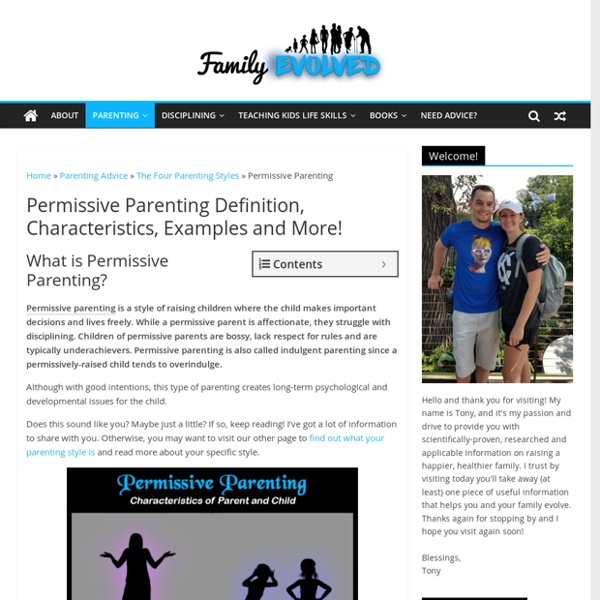Uninvolved Parenting Definition, Characteristics, Examples and More!
What is Uninvolved Parenting? Uninvolved parenting is a style of raising children where the parent is negligent towards the child’s emotional and developmental needs. The uninvolved parent is preoccupied with their own desires and is unavailable to provide any guidance or nurturing to the child. A child raised by an uninvolved parent is often self-conscious, antisocial, immature, depressed and lonely. This type of parenting creates long-term psychological and developmental issues for the child.
Authoritative Parenting Definition, Characteristics, Examples and More!
Authoritative parenting is a style of raising children that involves thoughtful and intentional nurturing. The parent disciplines using compassion, respect and understanding. Mental and emotional well-being is always the goal of the authoritative parent. Children raised by authoritative parents receive lots of love and affection and are often respectful, trustworthy, social, confident and logically-thinking problem solvers. Children thrive in such an environment.
Uninvolved Parenting Style - Traits And Effects on Children
Uninvolved or neglectful parenting is a considerably new parenting style that does away with hand-holding and guiding the children. It lets them learn by themselves. Parents could be uninvolved in varying degrees. While most parents look after the basic needs such as food and shelter for their kids, some others neglect their children completely.
Authoritarian Parenting Definition, Characteristics, Examples and More!
What is Authoritarian Parenting? Authoritarian parenting is a style of raising children using strict and excessive amounts of rules.
Setting limits is an important part of good parenting.
Most parents hate the idea of causing their child to get upset. They don’t want to incite a tantrum, and they certainly don’t want their child to be angry at them. Haven't we all felt that way? Besides, it's so hard to know whether what we're asking is developmentally reasonable. And we're so tired!
History and the study of Diana Baumrind
In this article on the 3 parenting styles formulated by Diana Baumrind, you'll get: Quick background information about her research and methods. An important understanding of her 1960s concepts of demandingness and responsiveness that she used as 'measuring' tools to categorize the parenting styles. A detailed but lively description of her results: - The authoritarian parenting style- The permissive parenting style- The authoritative parenting style - And the later added, neglectful / uninvolved parenting style.
16 Authoritarian Parenting Style Pros and Cons – ConnectUS
There are several different parenting styles practiced around the world. One of the most common in use is the authoritarian parenting style. This method of parenting is often expressed in the phrase, “Because I said so.” Parents demand compliance from their children with this style. Rewards and consequences are then offered based on the acceptance levels offered by the child. Descriptions of it compare the authoritarian parent to a king, queen, or dictator.
Many Singaporeans’ parenting style not helping children succeed - TODAYonline
I was disturbed to read the report “MP proposes piloting cluster of schools without exams, streaming” (Jan 22). In the current debate on how best to restructure the education system, more people seem inclined to wash the outside of a dirty cup and call it clean, but leaving the inside filthy as ever. An examination-free education system would serve only to mask the inadequacies of the current generation of pupils, rather than help them to succeed. While some of the pressure they face is due to the existing system, my experience as an educator tells me that the root problem lies with the quality of young people now. Born into a world where advanced technology is at their fingertips, our children are accustomed to having everything quickly and with little effort.
12 Ways to Become a More Authoritative Parent
There isn’t a single formula for raising children well. After all, parenting isn’t an exact science. There’s definitely a bit of an art to good parenting. Researchers who examine parenting styles have consistently found authoritative parents raise happier and healthier children who are equipped to face real-world challenges. The good news is, everyone has the ability to become a more authoritative parent. And you can match authoritative parenting strategies to your child’s unique temperament to ensure you aren’t using a cookie-cutter approach to parenting.
Still unsure? Take this quiz to find out!
Parenting Styles No one denies that parenting is difficult, but you can make it easier on yourself by identifying your parenting style. According to scientists, there are four parenting styles. Parents are authoritative, authoritarian, indulgent, or neglectful. Identifying where you fall on the spectrum is a great way to determine what you need to work on to become a better parent.



